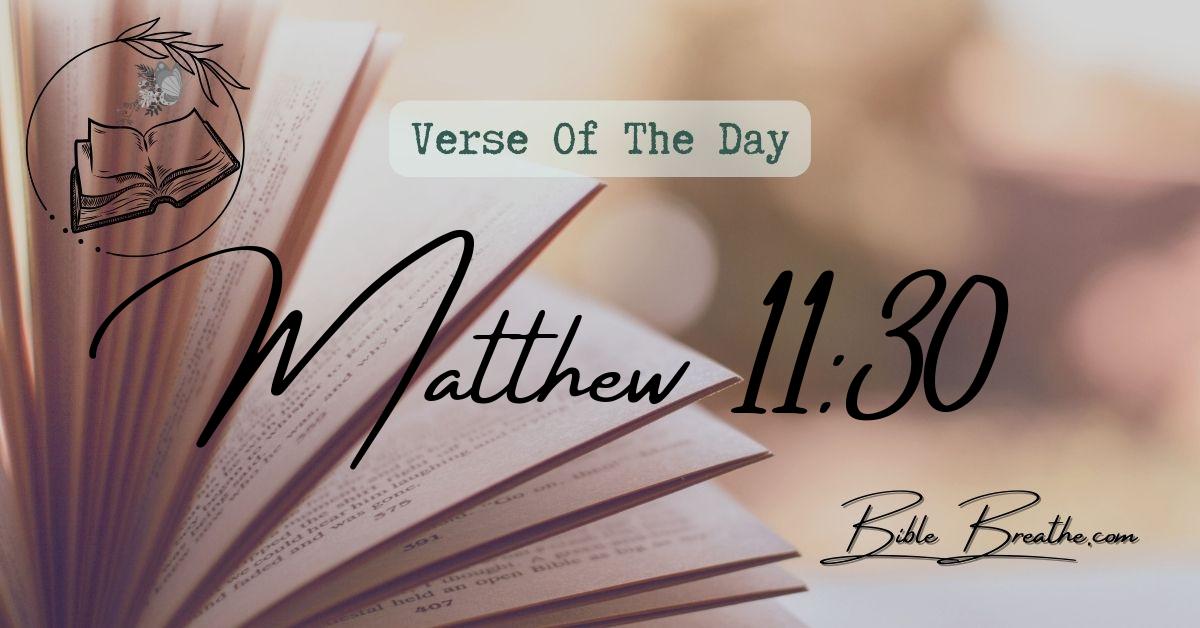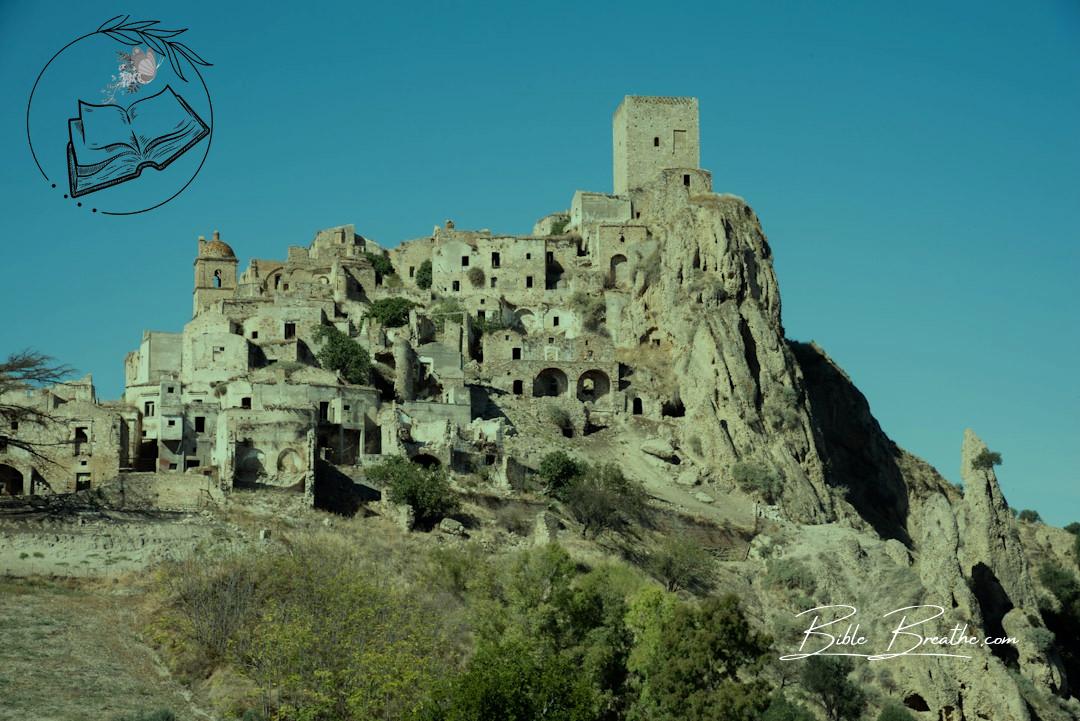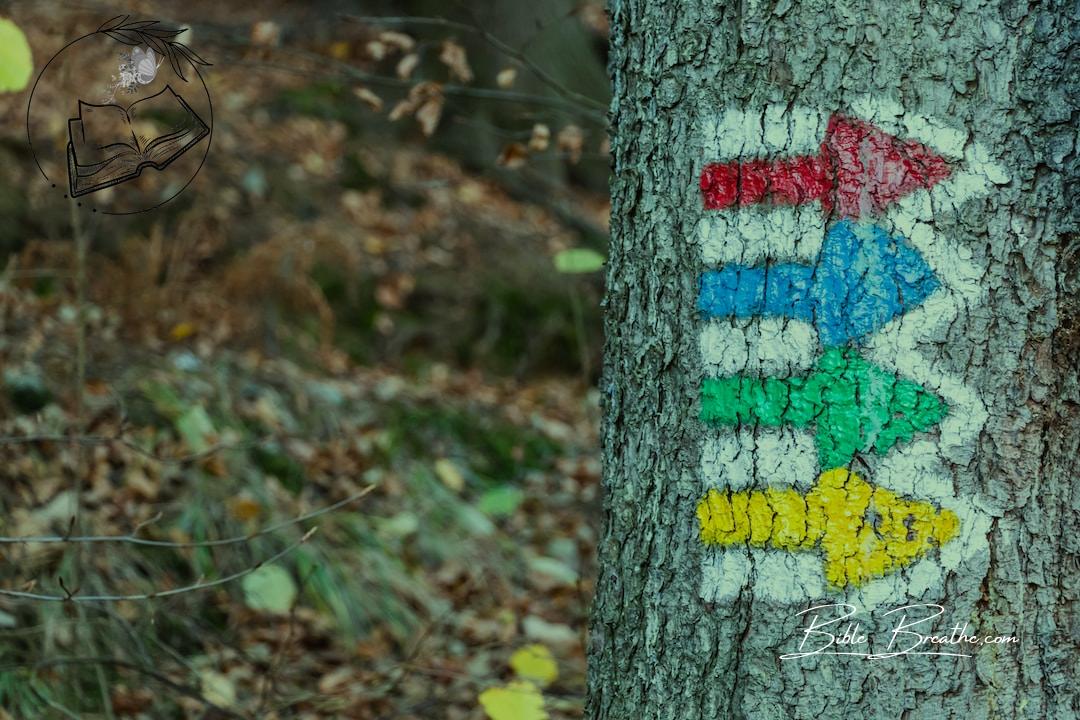Matthew 11:30 brings forth a powerful message straight from Jesus’ teachings on rest.
So, we’re diving into the book of Matthew, right?
Imagine this verse like a spotlight in a dark room—it’s shining bright for a reason!
Jesus throws this curveball of comfort, saying, “My yoke is easy, and my burden is light.”
Picture it: feeling like you’ve got the weight of the world on your shoulders, and suddenly, Jesus offers to swap that out for something light, like exchanging a hefty backpack for a feather.
I mean, seriously, who wouldn’t want that kind of relief?
This verse explains Christ’s yoke, bringing you spiritual relief like nothing else.
It’s like finding the coziest spot on a chaotic rollercoaster ride, where suddenly, everything feels alright.
Now, let’s unpack this verse together and discover how Jesus invites us to unload our heavy baggage and find divine comfort in Christianity.
It’s not just about lightening the load; it’s about finding peace and rest in a world that’s spinning a mile a minute.
So, let’s journey through Matthew 11:30 and uncover the secrets to carrying a lighter burden in our lives.
Trust me, it’s a game-changer.
Come unto me, all ye that labour and are heavy laden, and I will give you rest.” – Matthew 11:28 (KJV)
Key Takeaways
- Matthew 11:30 delivers a comforting message from Jesus, assuring us that His yoke is easy and His burden is light, offering solace to those weary and burdened.
- This verse encapsulates Christ’s invitation to find rest in Him, emphasizing His gentle and humble nature that provides relief from life’s heavy burdens.
- In the hustle and bustle of today’s society, Matthew 11:30 is a timely reminder to lay down our anxieties, stresses, and self-imposed pressures at the feet of Jesus, seeking His peace and rest.
- It challenges the modern believer to prioritize a relationship with Christ, understanding that true rest and contentment are found not in worldly achievements but in the embrace of the Savior.
- Embracing the essence of Matthew 11:30 allows us to navigate life’s challenges with a renewed perspective, recognizing that with Jesus, we are equipped to handle any situation with grace and ease.
Matthew 11:30: The Light Burden of Christ
Hey there, beloved community!
Today, we’re diving into the soothing words of Jesus found in Matthew 11:30, where he unravels the profound mystery of finding rest in Him.
Verse of the Day:
“Come unto me, all ye that labour and are heavy laden, and I will give you rest. Take my yoke upon you, and learn of me; for I am meek and lowly in heart: and ye shall find rest unto your souls.” – Matthew 11:30, KJV
Basic Facts of the Verse:
| **Attribute** | **Value** |
|---|---|
| Book | Gospel of Matthew |
| Chapter | 11 |
| Verse | 30 |
| Christian Bible Part | New Testament |
| KEYWORDs | Rest, yoke, learn, meek, lowly |
| Topics | Spiritual rest, discipleship |
| Bible Themes | Divine comfort, burden-sharing |
| People | Jesus, laboring and heavy-laden |
| Location | Galilee (contextual) |
Feel the weight of these words, my friends.
In the hustle and bustle of life, Jesus invites us to find our rest in Him, promising a yoke that’s light and a heart that’s meek.
Let’s journey together towards the tranquility He offers.
Matthew 11:30 KJV Cross References
These are some Bible verses related to Matthew 11:30:
| **Cross Reference Verse (KJV)** | **Verse** |
|---|---|
| Proverbs 3:17 | Her ways are ways of pleasantness, and all her paths are peace. |
| 1 John 5:3 | For this is the love of God, that we keep his commandments: and his commandments are not grievous. |
| 1 Peter 5:7 | Casting all your care upon him; for he careth for you. |
| Psalm 55:22 | Cast thy burden upon the Lord, and he shall sustain thee: he shall never suffer the righteous to be moved. |
| Psalm 116:29 | O Lord, truly I am thy servant; I am thy servant, and the son of thine handmaid: thou hast loosed my bonds. |
| Philippians 4:7 | And the peace of God, which passeth all understanding, shall keep your hearts and minds through Christ Jesus. |
| Isaiah 28:12 | To whom he said, This is the rest wherewith ye may cause the weary to rest; and this is the refreshing: yet they would not hear. |
| Psalm 62:1 | Truly my soul waiteth upon God: from him cometh my salvation. |
| Psalm 37:7 | Rest in the Lord, and wait patiently for him: fret not thyself because of him who prospereth in his way, because of the man who bringeth wicked devices to pass. |
Historical and Cultural Context of Matthew 11:30
Photo modified by BibleBreathe.com. Original photo by Serena Repice Lentini on Unsplash
Ever tried lugging around a suitcase only to realize halfway through your journey that it’s way too heavy?
That’s the metaphor Jesus painted with Matthew 11:30.
But here, He wasn’t talking about physical baggage; He was addressing the weight of religious burdens and the promise of finding spiritual relief.
Dive back into ancient Israel.
The Jewish people, though God’s chosen, were neck-deep in religious rituals and societal expectations.
Their spiritual lives?
More of checking boxes and less of genuine relationship.
Pharisees with their lengthy scrolls, and priests with their elaborate rituals.
Enter Jesus, with a revolutionary teaching: “My yoke is easy, and my burden is light.”
The yoke?
Traditionally a wooden beam, placed on oxen.
But Jesus was playing on words.
The “Yoke of Christ explained” wasn’t about wood; it was about freedom.
Amid the legalistic practices, He introduced a relationship, replacing heavy tradition with divine comfort in the New Testament.
Imagine being an average Jew, back then.
You’re overwhelmed, trying to keep up with the Law, only to hear Jesus offer a different way – a lighter way.
This teaching was radical, revolutionary.
In an era where spirituality was about rituals, Jesus was inviting them to rest.
Fast forward to today.
How often do we, in our modern hustle, feel weighed down?
Yet, the call remains.
Amidst our complexities, do we hear the whisper of Jesus’ teachings on rest?
Can we truly embrace the light burden in Christianity?
Because, my friends, in this journey of faith, we aren’t meant to trudge along, burdened and broken.
We’re called to walk hand in hand with a Savior who says, “Come, find rest.”
Unpacking the Rest in Matthew 11:30
You ever tried carrying a backpack filled with bricks?
Heavy, right?
But what if you swapped those bricks for feathers?
That’s the difference between the burdens of this world and Jesus’ teachings on rest.
- “For my yoke” – A yoke, traditionally, is a wooden crosspiece fastened over the necks of two animals, binding them together. In this context, it speaks of partnership and commitment. But what’s special about the Yoke of Christ explained here?
- “is easy” – The original Greek word here, ‘χρηστός’ (chrestos), can also mean “kind” or “good”. Jesus isn’t giving us a taskmaster’s whip; he’s offering a supportive hand. A divine comfort in the New Testament era.
- “and my burden” – While the world weighs us down with expectations, deadlines, and pressures, Jesus offers an alternative.
- “is light” – Not weightless, but manageable, bearable. A Light burden in Christianity is one infused with love, purpose, and divine support. It’s the difference between being crushed under a boulder and floating on a cloud.
In the broader context of Matthew 11, Jesus extends an invitation to find spiritual relief.
He acknowledges our weariness, our struggles, and offers a divine partnership.
When paired with Him, our load becomes shared, our stress finds relief, and our souls discover true rest.
Ever felt overwhelmed?
Overburdened?
Jesus’ offer isn’t a magic wand to make life’s problems disappear.
It’s an invitation to walk alongside Him, to experience life with the one who promises rest and relief.
So, why carry bricks when you can float on feathers? 🎒🕊️
Comparative and Literary Analysis of Matthew 11:30
Similarities with other religious texts:
- Restful Teachings: Matthew 11:30, emphasizing Jesus’ teachings on rest, resonates with the Quran’s teachings of seeking peace through submission to God.
- Shared Spiritual Load: Just as the Yoke of Christ explained denotes sharing the burden, the Buddhist concept of Sangha (community) stresses mutual support in the spiritual journey.
- Seeking Serenity: Finding spiritual relief is a universal quest. The Tao Te Ching, for instance, often speaks of finding peace by aligning with the Tao.
- Lightening Life’s Loads: The idea of a Light burden in Christianity finds a mirror in Hindu scriptures where surrender to the divine is seen as a path to ease life’s troubles.
- Divine Solace: The concept of Divine comfort in the New Testament is paralleled in Sikhism’s Guru Granth Sahib, where God’s name is a refuge for the weary soul.
Differences with other religious texts:
- Christ’s Unique Yoke: The specific metaphor of Christ’s yoke, as given in Matthew 11:30, offers a distinct Christian perspective on spiritual commitment and rest.
- Personal Invitation: This verse is a direct invitation from Jesus, emphasizing a personal relationship with Him, unlike some other spiritual teachings.
- Rest in Active Following: The verse suggests rest comes from actively taking on Jesus’ yoke, a dynamic that is different from passive forms of spiritual relief found elsewhere.
- Gentle and Humble Heart: Jesus’ reference to His gentle and humble heart in relation to the yoke is a distinctive Christian element.
- Immediate Divine Comfort: While many scriptures emphasize divine comfort, Matthew 11:30 uniquely promises immediate relief by taking on Jesus’ yoke.
Ever felt the weight of the world pressing down on you?
Imagine switching that heavy backpack of life’s challenges for a feather-light one.
That’s Matthew 11:30 for you!
It’s like trading in those old, worn-out shoes for a pair of cloud-like sneakers.
With the Yoke of Christ explained, do you feel the shift from burdened to blessed?
How do you resonate with the Divine comfort in the New Testament?
In life’s marathon, are you still lugging around your heavy baggage, or have you discovered the lightness of Jesus’ yoke?
Theological Implications and Modern Interpretations and Misinterpretations of
Matthew 11:30:
How different religious groups interpret the verse:
- Roman Catholicism: Views the yoke of Christ as the sacraments and teachings of the Church that guide believers towards salvation and spiritual relief.
- Eastern Orthodox: Emphasizes the synergy between God and man, wherein the yoke represents our participation with Christ in finding spiritual relief.
- Protestantism: Suggests that the light burden in Christianity comes from the grace of Christ, eliminating the need to earn salvation through works alone.
- Seventh-day Adventists: Understands the rest offered by Jesus as the true Sabbath rest, a physical and spiritual respite.
- Mormonism: Sees the yoke as the covenants made with God, which, when adhered to, lead to divine comfort in the New Testament era and beyond.
- Jehovah’s Witnesses: Interpret the yoke as the responsibility of preaching and following God’s commandments, which is light because of the divine aid provided.
The verse’s role in the broader biblical narrative:
In the heart of the New Testament, Matthew 11:30 is a beacon of Christ’s compassion and divine comfort.
It’s as if Christ, seeing humanity’s weary souls, extends an olive branch – an easier way, a lighter path.
It emphasizes Jesus’ teachings on rest, portraying a Savior not as a demanding Lord but as a comforting friend.
Contemporary debates about the verse’s meaning and its relevance in today’s world:
With burnout becoming an epidemic, does Matthew 11:30 offer a remedy?
Is our modern yoke self-imposed, and are we missing out on the light burden in Christianity?
Have we, in our digital age, forgotten the essence of finding spiritual relief?
This verse beckons us: in a world of endless noise, there’s a still, small voice inviting us to rest.
The question remains: will we accept the invitation?
Matthew 11:30 – The Scientific Balance of Burdens and Rest
Photo modified by BibleBreathe.com. Original photo by Testalize.me on Unsplash
Imagine this – you’re holding a pendulum.
With a slight push, it sways effortlessly back and forth, defying gravity with each swing.
This natural phenomenon, governed by the laws of physics, is a testament to the balance found in nature.
Now, reflect upon Matthew 11:30, where Jesus declares, “For my yoke is easy, and my burden is light.”
How can we draw a parallel between this verse and the scientific wonders we witness?
In the realm of science, we learn about equilibrium – that state where forces harmoniously counteract each other.
This idea resonates with Jesus’ teachings on rest.
He presents a spiritual equilibrium, where the burdens we bear are counteracted by divine comfort, ensuring our souls find their needed balance.
But what does this “yoke” signify?
In ancient times, yokes were tools designed to distribute weight evenly between two animals, making their task manageable.
Metaphorically, the Yoke of Christ explained is His teachings and the way of life He encourages, designed to spread out life’s pressures, making our spiritual journey smoother.
It’s a testament to finding spiritual relief.
In modern times, we’ve all felt the pressure of a weighted backpack.
Science tells us that the even distribution of weight can make a heavy load feel significantly lighter.
Isn’t this the essence of the light burden in Christianity?
By aligning ourselves with Christ’s teachings, our once cumbersome loads can be made more bearable.
In our search for knowledge, whether spiritual or scientific, there lies a common yearning: understanding the world around us.
In a universe ruled by order and patterns, Jesus’s message in Matthew 11:30 offers a divine formula for mental and spiritual well-being.
So, the next time you witness the harmony of nature – be it the symmetrical pattern of a snowflake or the balanced swing of a pendulum, remember the divine balance Jesus offers.
Both science and scripture beckon us to find rest in the midst of chaos, don’t they?
Finding Rest in the Hustle: The Relevance of Matthew 11:30 Today
Ever felt like life’s treadmill is set a little too fast?
In the midst of the hustle, there’s a voice calling out, reminding us of an offer that’s too good to pass up.
Matthew 11:30 says, “For my yoke is easy, and my burden is light.” This isn’t just an ancient promise; it’s a modern-day lifeline.
So, what’s the real-world application of this verse?
Real-Life Implications
Think about that friend who’s always got your back, lightening your load when things get tough.
That’s Jesus.
His words in Matthew 11:30 aren’t mere poetry but a genuine proposition.
In a world of burnouts and endless to-dos, Jesus’ teachings on rest beckon us to a different rhythm.
The yoke of Christ, often misunderstood, is not about piling on more weight.
Rather, it’s about sharing our burdens with the ultimate partner.
Step-by-Step Embrace:
- Morning Meditation: Start the day by meditating on Matthew 11:30. Visualize handing over your worries to Jesus, and imagine the spiritual relief that follows.
- Shift the Perspective: Every challenge, big or small, remember it’s not yours to bear alone. Feel that light burden in Christianity? That’s the magic of shared weight.
- Evening Reflection: End your day with gratitude. Acknowledge moments when you felt God’s yoke easing your strain. The more you recognize it, the more you’ll lean into it.
- Open Up in Prayer: It’s one thing to read about the yoke and another to ask for it. In your prayer time, actively request Jesus to share your burdens.
- Community Connection: Sharing real-life experiences with fellow believers can amplify the experience of divine comfort in the New Testament. It’s powerful to know you’re not alone.
- Consistent Scripture Study: Dive into other scriptures about rest and peace. The Bible is rich with promises waiting to be unwrapped.
Now, ponder this: If there was a way to live life with half the weight and double the purpose, wouldn’t you take it?
That’s what Jesus offers.
Matthew 11:30 isn’t a relic from the past, but a remedy for the present.
In a world chasing after the wind, maybe it’s time we stop, breathe, and let Him lead the dance.
Matthew 11:30: Finding Rest in the Yoke of Christ
Photo modified by BibleBreathe.com. Original photo by Zbyněk Skrčený on Unsplash
Matthew 11:30 proclaims, “For my yoke is easy, and my burden is light.” This verse, a cornerstone of Jesus’ teachings on rest, beckons us to find solace and relief in the embrace of Christ.
But what does it truly mean to take on the yoke of Christ, and how can we apply this teaching in our daily lives?
Exegetical Questions and Critical Thinking for Engagement:
Diving into the heart of Matthew 11:30, we’re invited to not just read, but to engage, introspect, and truly grasp the profound message Jesus conveys.
It’s not just about knowing the Word; it’s about experiencing its transformative power.
- How does the imagery of a “yoke” resonate with your personal struggles and burdens?
- In what ways have you felt the light burden in Christianity in your life?
- Considering the divine comfort in the New Testament, how does this verse inspire you to seek solace in Christ during challenging times?
- How can the promise of an “easy yoke” guide your daily decisions and actions?
Let’s contextualize this verse in our daily lives:
- Scenario 1: You’re overwhelmed with work, family responsibilities, and personal challenges. How can embracing the yoke of Christ explained provide relief?
- Scenario 2: A friend confides in you about their feelings of hopelessness and despair. How can you use this verse to offer them hope and finding spiritual relief?
- Scenario 3: You’re faced with a moral dilemma, torn between two difficult choices. How can the promise of Christ’s light burden guide your decision?
Reflecting on recent events:
- News 1: Morocco Races to Dig Out Survivors After Strongest Quake in 100 Years. Amidst such devastation, how can Matthew 11:30 provide hope and perspective to those affected and the global community?
- News 2: Biden Forges Deeper Ties With ‘Critical’ Partner in Hanoi. In the realm of international relations and diplomacy, how can leaders and nations apply the teachings of this verse to foster peace and collaboration?
Whether you’re delving into theological discussions, seeking personal devotion, or simply exploring Christian beliefs, remember: in Christ, we find rest, relief, and the promise of a burden that’s truly light.
Frequently Asked Questions (FAQs) About Matthew 11:30
What does Matthew 11:30 mean in the context of Jesus’ teachings?
Matthew 11:30 reflects Jesus’ invitation to find rest by taking His yoke.
This verse emphasizes the ease and lightness of following Jesus compared to burdensome religious legalism.
It teaches that embracing Christ’s teachings provides spiritual rest, offering a refreshing and fulfilling way of life rooted in grace and the yoke of discipleship.
How can we apply the yoke of Jesus mentioned in Matthew 11:30 in our daily lives?
Applying the yoke of Jesus involves surrendering our burdens and aligning our lives with His teachings.
It means cultivating humility, trusting His guidance, and finding rest in His grace.
Regular prayer, studying Scripture, and emulating Christ’s love in our actions contribute to a life yoked with Jesus, fostering peace and spiritual fulfillment.
Are there other Bible verses that complement the message conveyed in Matthew 11:30?
Matthew 11:30 invites believers to take Christ’s yoke for a light burden.
Other verses complementing this message include Philippians 4:6-7, where believers are encouraged to cast their anxieties on Christ, and 1 Peter 5:7, underscoring the importance of casting cares upon God, collectively highlighting reliance on Christ for peace and rest.
In what ways does understanding the yoke in Matthew 11:30 bring comfort and rest to believers?
Matthew 11:30 refers to Jesus’ yoke as easy and burden as light.
In a cultural context, yokes were custom-fitted for each ox, symbolizing Jesus’ tailored guidance for believers.
Theological significance lies in surrendering to Christ’s teachings, finding rest in His grace, and experiencing the freedom that comes from embracing His yoke.
Can you provide insights into the cultural and historical significance of the yoke reference in Matthew 11:30?
In Matthew 11:30, the yoke symbolizes the teachings and burdens of life.
During the historical context, yokes were wooden beams placed on oxen for labor.
Jesus’ reference indicates a contrast between the burdensome legalism of the Pharisees and the liberating, restful nature of following Him.
It underscores the invitation to find spiritual rest and ease through a relationship with Jesus Christ.




